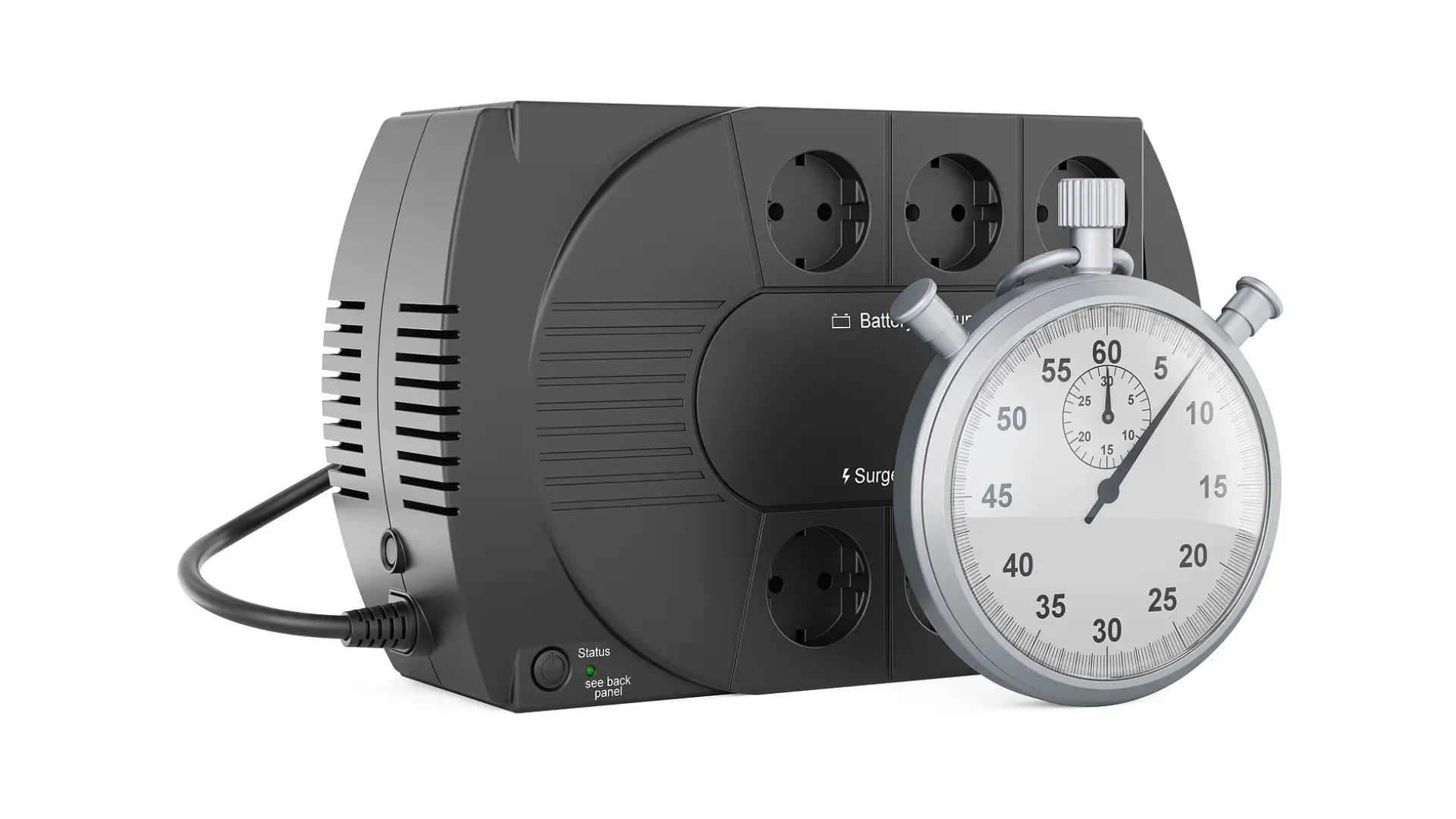
The Reason Why Do We Need Uninterruptible Power Supply
Reflecting on our modern reliance on technology, the Uninterruptible Power Supply (UPS) emerges as a silent hero that safeguards our digital existence. In those moments when power interruptions threaten to disrupt our workflow, disconnect us from entertainment, or even jeopardize critical services like healthcare and communication, the UPS steps in as a reassuring guardian.
Personally, I've come to appreciate how this unassuming device ensures that our lives remain seamlessly connected, acting as a safety net that prevents data loss, work disruptions, and communication breakdowns. It's a reminder that even amidst the uncertainties of power outages, we can continue to navigate the digital landscape with confidence, thanks to the steadfast presence of UPS.
Introduction to Uninterruptible Power Supply (UPS)
Delving into the realm of uninterruptible power supply (UPS) systems, it becomes clear that they are far more than just backup batteries. Picture this: when the lights suddenly go out due to a power failure, a UPS steps in as a reliable ally, ensuring that critical devices and systems don't miss a beat.
Beyond this crucial role, a UPS reveals its true versatility. It becomes a stalwart guardian of consistent power, shielding sensitive equipment from the tumultuous fluctuations that can occur in the primary power supply. Moreover, it's like a vigilant protector against power surges, sparing valuable electronics from potential damage.
As someone who values uninterrupted productivity and the safety of electronic investments, I've come to appreciate the multifaceted benefits that a UPS brings – from maintaining seamless operations to providing an essential layer of defense against unpredictable electrical anomalies.
Importance of Uninterruptible Power Supply

In the digital age, power stability is paramount for both businesses and households. The Uninterruptible Power Supply (UPS) serves as the cornerstone of this requirement, ensuring that electronic devices remain operational even when faced with power interruptions. Here’s why UPS is so important:
Ensuring Business Continuity
To maintain seamless business operations, particularly in critical sectors such as IT, banking, and healthcare, the need for a constant and reliable power source cannot be overstated. In these industries, even a brief interruption in power supply can lead to substantial financial losses and the compromise of vital data. Uninterruptible Power Supply (UPS) systems play a pivotal role in addressing these challenges and safeguarding business continuity.
Importance of a Constant Power Source
- Critical Operations Dependence: Industries such as IT, where data centers operate around the clock, cannot afford power interruptions. Similarly, healthcare facilities rely on continuous power for life-saving medical equipment, and financial institutions need uninterrupted service to manage transactions seamlessly.
- Data Integrity: The integrity of digital data is paramount in various sectors. An abrupt power outage can lead to data corruption, loss, or potential breaches, undermining the confidentiality and availability of sensitive information.
- Operational Efficiency: Consistent power supply enhances operational efficiency by preventing disruptions in workflows. Employees can work without disruptions, and automated systems can function seamlessly.
Mitigating Downtime Costs
- Direct Revenue Impact: Consider the scenario of an online store experiencing just an hour of downtime. The loss of potential sales during this time can have a significant impact on revenue. UPS systems help avert such revenue losses by ensuring uninterrupted operations.
- Customer Trust: Extended downtime can erode customer trust and loyalty. Customers expect seamless access to services, and any disruption can lead to frustration and a negative perception of the business. A reliable UPS system maintains a consistent customer experience.
- Reputation Preservation: Businesses strive to build and uphold their reputation. A single instance of prolonged downtime can lead to negative publicity and damage the company's image. With a UPS in place, a business can demonstrate its commitment to reliability and professionalism.
Protecting Sensitive Equipment
In modern industries and sectors where precision and reliability are imperative, the protection of sensitive equipment stands as a paramount concern. This involves safeguarding against the potentially harmful effects of voltage fluctuations, which can significantly impact the functionality and longevity of critical equipment. Uninterruptible Power Supply (UPS) systems play a crucial role in mitigating these risks and preserving the integrity of delicate instruments.
Guarding Against Voltage Fluctuations
- Equipment Vulnerability: Sensitive equipment, ranging from advanced medical machinery and intricate laboratory instruments to data servers, is highly susceptible to voltage fluctuations. Even minor variations in voltage levels can lead to malfunctions, data corruption, or even complete equipment failure.
- Buffering Effect: A UPS serves as a protective buffer between the equipment and the power source. It ensures that the incoming voltage remains within a stable and safe range, shielding the equipment from sudden spikes or drops in power that could otherwise cause irreparable damage.
- Consistent Voltage Supply: By providing a consistent and regulated voltage output, a UPS ensures that the sensitive equipment receives a steady power supply, regardless of external power quality issues or grid fluctuations.
Extending Equipment Life
- Mitigating Strain: Voltage fluctuations not only pose immediate risks but can also have long-term consequences. Fluctuations in power can subject machinery to unnecessary stress and strain, accelerating wear and tear over time.
- Optimal Operating Conditions: With a UPS in place, sensitive equipment operates under optimal conditions. The equipment is shielded from the adverse effects of voltage instability, leading to reduced wear on components and extended operational life.
- Investment Protection: High-value equipment often represents a substantial investment for organizations. Utilizing UPS technology helps protect this investment by minimizing the likelihood of premature equipment failure due to voltage-related issues.
- Cost Efficiency: The extended operational life of equipment resulting from consistent power supply offered by a UPS translates into cost savings. Organizations can avoid the need for frequent repairs, replacements, and associated downtime.
Data Protection and Loss Prevention
Avoiding Data Corruption:
In the realm of modern technological operations, the significance of uninterruptible power supply (UPS) extends beyond mere power backup. Particularly, one of the paramount rationales underlying the necessity for UPS implementation lies in its pivotal role in safeguarding against data corruption.
The intricate and interdependent nature of digital data transactions, such as data transfers and updates, renders them susceptible to the adverse consequences of abrupt power outages. The volatile interruption of power during these critical operations can potentially lead to data corruption, which can have far-reaching implications for data integrity and system reliability.
Giving Time for Proper Shutdown:
Beyond its fundamental function as a power backup mechanism, a UPS confers an invaluable opportunity for orchestrating methodical and controlled shutdown procedures. This temporal window, albeit often brief, offers a strategic buffer wherein systems can be systematically powered down.
This deliberate shutdown sequence not only averts the abrupt discontinuation of ongoing processes but also serves as a preventive measure against the loss of unsaved work. By affording this structured shutdown duration, a UPS effectively curtails the risks associated with sudden power cuts, thereby mitigating the likelihood of data corruption.
Consequently, the implementation of a UPS augments operational resilience, minimizes data vulnerability, and reinforces the overall stability of systems during instances of power instability.
Safety and Prevention from Power Surges
In the realm of electrical systems, safety and protection against power surges emerge as critical concerns. Power surges, which can occur due to a range of factors, including lightning strikes and fluctuations in the power grid, have the potential to cause immediate and lasting damage to connected devices. To address these challenges comprehensively, the implementation of Uninterruptible Power Supply (UPS) systems equipped with surge protection features is essential.
Immediate Protection
- Power Surge Vulnerability: Power surges pose a significant threat to connected devices. These surges, characterized by sudden spikes in voltage, can lead to immediate and irreparable destruction of electronic components within the devices.
- Surge Protection Features: A UPS system incorporates surge protection mechanisms that detect abnormal voltage levels and respond swiftly to mitigate their impact. By acting as a barrier, the UPS diverts excess voltage away from connected equipment, preventing damage and ensuring continued functionality.
- Preservation of Investments: Many electronic devices represent substantial financial investments for individuals and organizations alike. By investing in UPS systems with surge protection, users safeguard their equipment against sudden and costly losses due to unexpected power surges.
Preventing Secondary Damages
- Unseen Consequences: Beyond the initial impact of power surges on connected devices, there exists the potential for cascading and secondary damages. For instance, a power surge-induced malfunctioning device can lead to overheating or electrical fires if left unattended, putting both property and lives at risk.
- Fire Prevention: The risk of fires resulting from power surges underscores the critical importance of early intervention. A UPS system acts as a preemptive safeguard, promptly neutralizing the excess voltage before it can escalate into hazardous situations such as fires.
- First Line of Defense: In scenarios where power surges initiate a chain reaction of equipment failures, a UPS serves as the first line of defense, interrupting the sequence and preventing the escalation of damages.
- Peace of Mind: By implementing UPS systems with surge protection, individuals and businesses gain a sense of security, knowing that their critical devices are shielded not only from immediate harm but also from the potential aftermath of power surges.
Types of Uninterruptible Power Supply

Uninterruptible Power Supply (UPS) systems play a pivotal role in providing backup power solutions, catering to diverse requirements across a range of scenarios. The UPS landscape comprises various distinct types, each engineered with specific features to address varying needs:
Standby (Offline) UPS
Among the most prevalent UPS variants, the Standby UPS configuration primarily caters to individual users and personal computers. Operating in a state of readiness, this UPS type remains in a passive mode until a power disruption is detected. Once such an event occurs, it swiftly switches from its standby mode to battery-powered backup, ensuring a seamless transition of power supply to connected devices.
Line-Interactive UPS
Widely employed within business networks and setups, the Line-Interactive UPS model offers a more advanced level of functionality. In addition to providing battery backup during power outages, this UPS type incorporates a valuable voltage regulation mechanism.
When confronted with voltage fluctuations such as brownouts or overvoltages, the Line-Interactive UPS adeptly manages these issues without immediately resorting to battery operation. This dual capability ensures stable power delivery to connected equipment and optimally manages power quality.
Online (Double-Conversion) UPS
At the pinnacle of UPS sophistication lies the Online UPS, renowned for its unparalleled protection capabilities. This type operates through a continuous process of power conversion, where incoming alternating current (AC) power is transformed into direct current (DC) power and subsequently reconverted back to AC.
By subjecting the power stream to this double-conversion process, the Online UPS guarantees an exceptionally stable and reliable power output. This level of precision makes it the ideal choice for safeguarding sensitive electronics, crucial data centers, and mission-critical server systems.
The Online UPS's unyielding commitment to maintaining consistent power quality ensures the utmost reliability and resilience for equipment operating under its protective umbrella.
Factors to Consider When Choosing a UPS
The process of choosing the most suitable Uninterruptible Power Supply (UPS) system involves a careful evaluation of several critical factors to ensure a dependable power backup solution. Here is an in-depth look at the key considerations to bear in mind:
Power Capacity Assessment
A fundamental step is to calculate the collective power consumption of all the devices that will be connected to the UPS. It is essential to select a UPS system with a power capacity surpassing this calculated total. This strategy guarantees that all devices receive sufficient power during unexpected outages, preventing disruptions to critical operations.
Runtime Duration
The runtime of a UPS system refers to the duration for which it can sustain power delivery from its internal battery. Depending on the specific application, it is necessary to determine whether a UPS offering a brief window for safe system shutdown is adequate or if an extended runtime, spanning hours, is required to maintain ongoing operations without interruption.
Equipment Sensitivity
In scenarios where sensitive electronic equipment is involved, the quality of the power waveform becomes a paramount consideration. More sophisticated UPS variants, such as Online UPS systems, come into play here. These advanced UPS models offer superior power consistency and waveform quality, ensuring optimal performance and protection for delicate devices.
Voltage Regulation Capability
Areas plagued by frequent voltage fluctuations demand UPS systems equipped with automatic voltage regulation features. The Line-Interactive UPS category is an example of a UPS type that excels in this regard. Such units actively stabilize incoming voltages, shielding connected equipment from potential damage caused by voltage instability.
Dimensional Aspects
The physical dimensions and design of the UPS system should harmonize with the intended installation location. Whether the UPS is destined for placement beneath a desk or within a server rack, the size and form factor must be evaluated to guarantee a seamless integration within the designated space.
Scalability Potential
Future growth prospects and evolving power requirements should not be overlooked. Selecting a UPS system that can be expanded with supplementary battery packs enables adaptable scalability. As power demands increase over time, the added battery capacity ensures extended runtime capabilities, accommodating changing operational needs.
Price and Brand Credibility
While cost is a factor, it's unwise to base the decision solely on the lowest price point. The reputation of the UPS brand and the feedback from users must be weighed to ascertain reliability and performance. Opting for a reputable brand with favorable reviews ensures a dependable power backup solution that can be trusted during critical situations.
Conclusion
In wrapping up this exploration of Uninterruptible Power Supply (UPS) systems, I've gained a profound appreciation for their indispensable role in our modern lives. Beyond their backup power function, UPS devices serve as steadfast guardians that shield us from power disruptions and potential damages caused by voltage fluctuations. This journey through the significance, types, and considerations of UPS has deepened my understanding of how these unassuming devices ensure seamless operations, data protection, and peace of mind in an increasingly digital world.
From personal experiences, I've come to value the reassurance a UPS brings – a feeling that my electronics are shielded against the uncertainties of power fluctuations. As technology continues to evolve, our reliance on consistent power grows, underscoring the UPS's crucial importance. Whether it's maintaining business continuity, upholding critical healthcare services, or safeguarding our digital assets, UPS systems stand as silent sentinels, allowing us to navigate our interconnected lives with confidence, regardless of power challenges that may arise.
Sources
continue reading
Related Posts
Uninterruptable Power Supplies In today's world, where technology keeps us […]
Uninterruptible Power Supply For Laptop In today's fast-paced digital world, […]
Small Uninterruptible Power Supply In today's digital age, where connectivity […]



